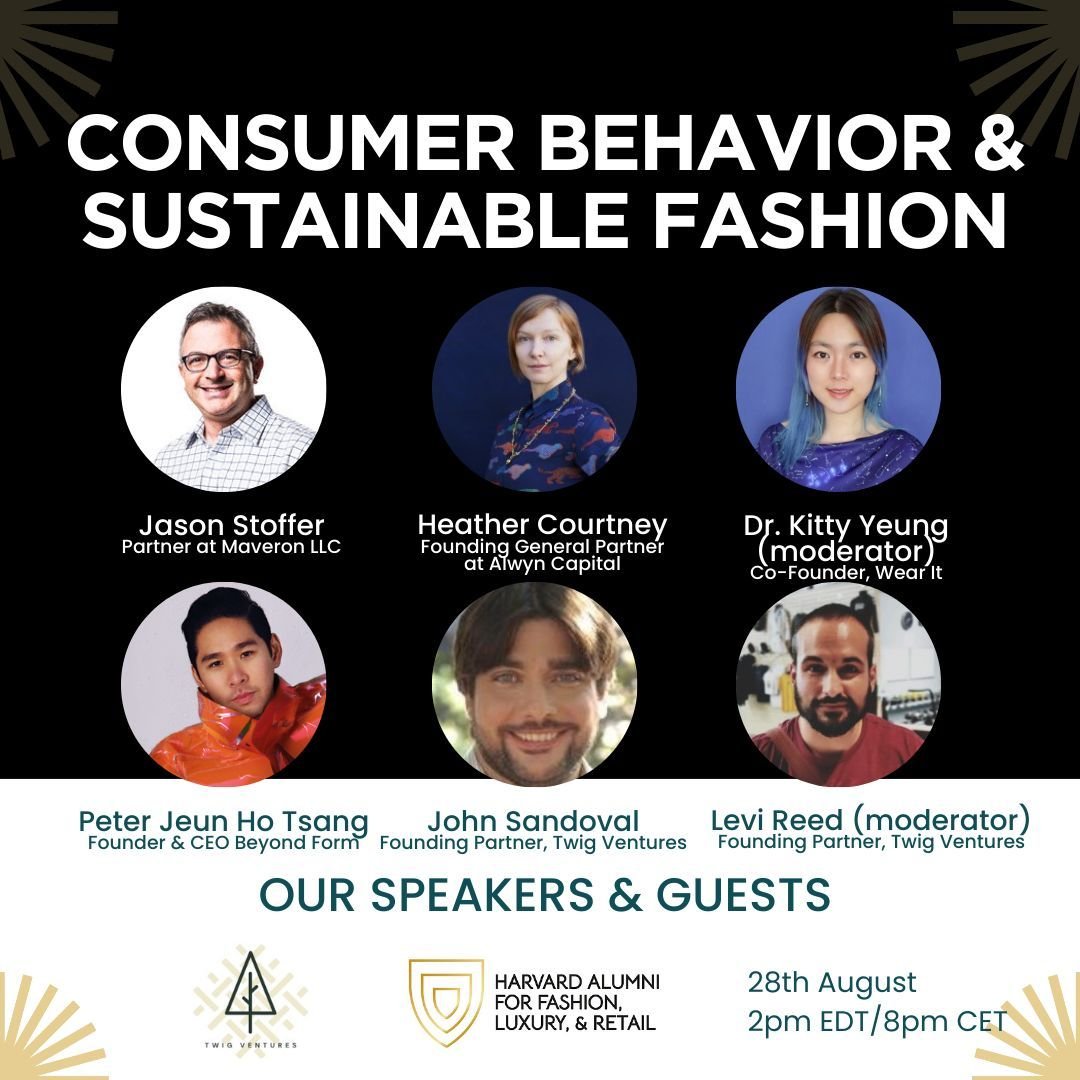Navigating Consumers & Sustainable Fashion: Insights from Twig Ventures Panel Discussion
Hello there fashion tech enthusiasts!
The fashion industry, often lauded for its creativity and innovation, has also faced criticism for its environmental and social impacts. However, a growing appetite for sustainable fashion is gaining momentum, driven by both consumer demand and technological advancements. On 28th August 2024, our CEO Peter Jeun Ho Tsang joined a panel discussion organised by Twig Ventures and Harvard Alumni for Fashion, Luxury & Retail discussing this very topic. Here’s the top insights that came out of the conversation and if you have time feel free to scroll down and watch the whole webinar.
The panel speakers. Some of you may recognise Kitty Yeung, as featured in the book Fashion Tech Applied
Key Trends and Challenges
The Affordability Gap: While consumers are increasingly aware of the environmental and social impacts of the fashion industry, affordability remains a significant barrier to adopting sustainable practices. Brands must find innovative ways to offer sustainable products at competitive prices without compromising on quality or ethical standards. Peter refers to the ThreUp report during the talk. Check it out.
The Technological Revolution: Innovations like AI, AR, and VR are transforming the fashion industry, providing new opportunities for sustainability. These technologies can streamline processes, reduce waste, and personalise the shopping experience, making it easier for consumers to find sustainable options that align with their preferences.
The Perils of Greenwashing: Many brands are accused of greenwashing, making misleading claims about their sustainability efforts. This erodes consumer trust and hinders progress towards a more sustainable fashion industry. True sustainability requires transparency, accountability, and verifiable actions.
Opportunities for Investors
Impact Investing: Investors seeking both financial returns and positive social and environmental impact can find compelling opportunities in the sustainable fashion sector. By investing in companies that prioritize sustainability, investors can contribute to a more ethical and sustainable future.
Technology-Driven Solutions: Investing in startups that develop fashion tech can drive innovation and accelerate the adoption of sustainable practices. These technologies can help reduce the industry's environmental footprint, improve supply chain transparency, and personalise the shopping experience.
Circular Economy: Supporting businesses focused on recycling, upcycling, and extending the lifespan of garments can contribute to a more sustainable fashion system. By promoting circularity, we can reduce waste and minimise the industry's environmental impact. Portfolio company Launderd is proving just that - consumers are proactively searching for ways to breathe new life into their existing wardrobes and they’re willing to pay for it.
Key Areas of Innovation
Sustainable Materials: Research and development of eco-friendly alternatives to traditional materials like leather, silk, and polyester are crucial for reducing the industry's environmental footprint. Innovations in plant-based materials, recycled textiles, and bio-based fibres are driving progress in this area.
Supply Chain Transparency: Fashion tech can be used to track and improve supply chain transparency, ensuring that ethical and sustainable practices are being followed throughout the production process. This includes traceability of materials, working conditions, and environmental impact.
Personalised Shopping: AI-powered recommendations can help consumers find sustainable options that align with their preferences and reduce waste. By understanding consumer preferences and behaviour, brands can offer more relevant and personalised recommendations, encouraging sustainable choices. Portfolio company AIMIRR is a great example of where retail is heading, really tailoring the experience to the individual.
The future of fashion is sustainable. By embracing fashion tech, prioritising transparency, and addressing consumer concerns, brands can create a more ethical and environmentally responsible industry. Investors who recognize these trends and support innovative solutions can play a vital role in driving this positive change.
As always if you’re an ambitious fashion tech founder wanting to also get support in such opportunities then we’d like to hear from you. Get in contact with us:

